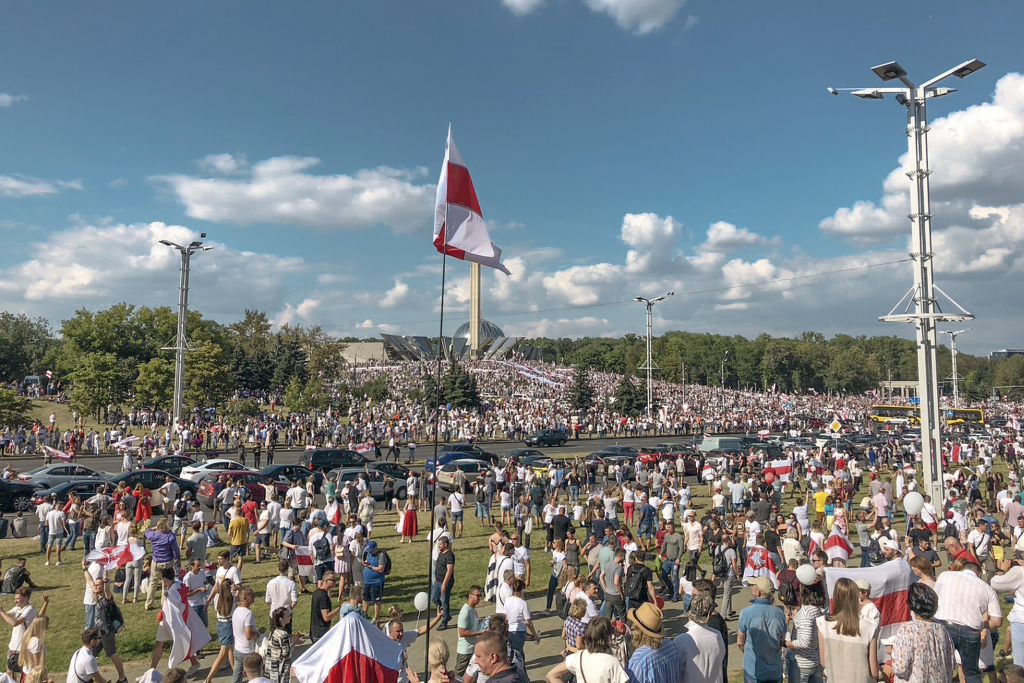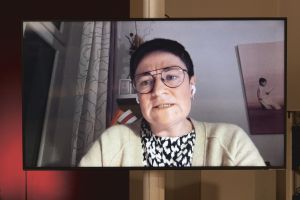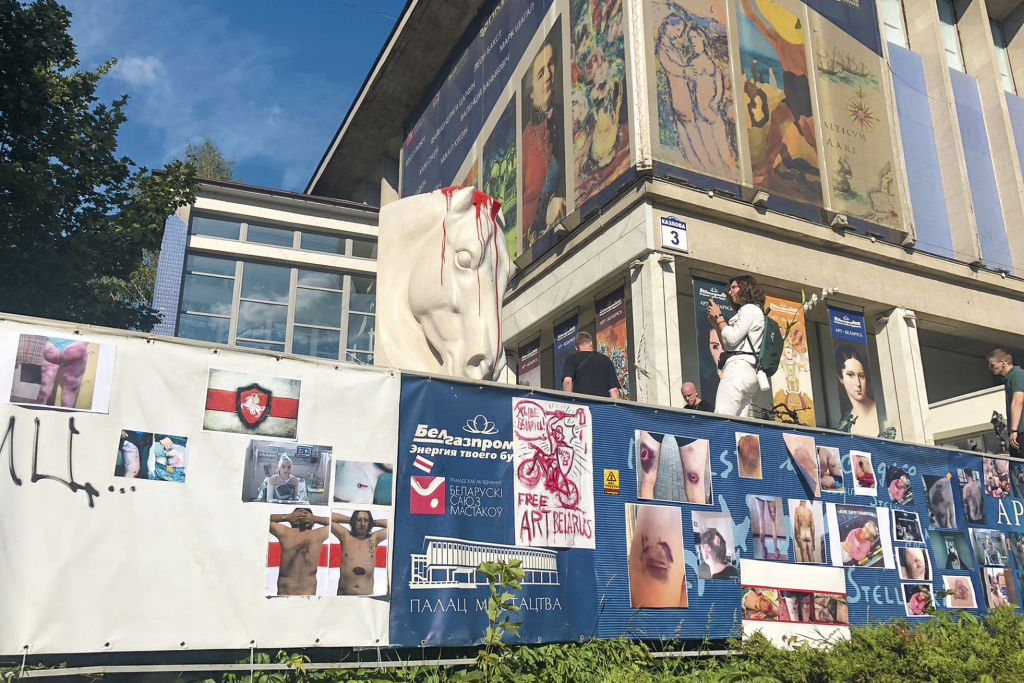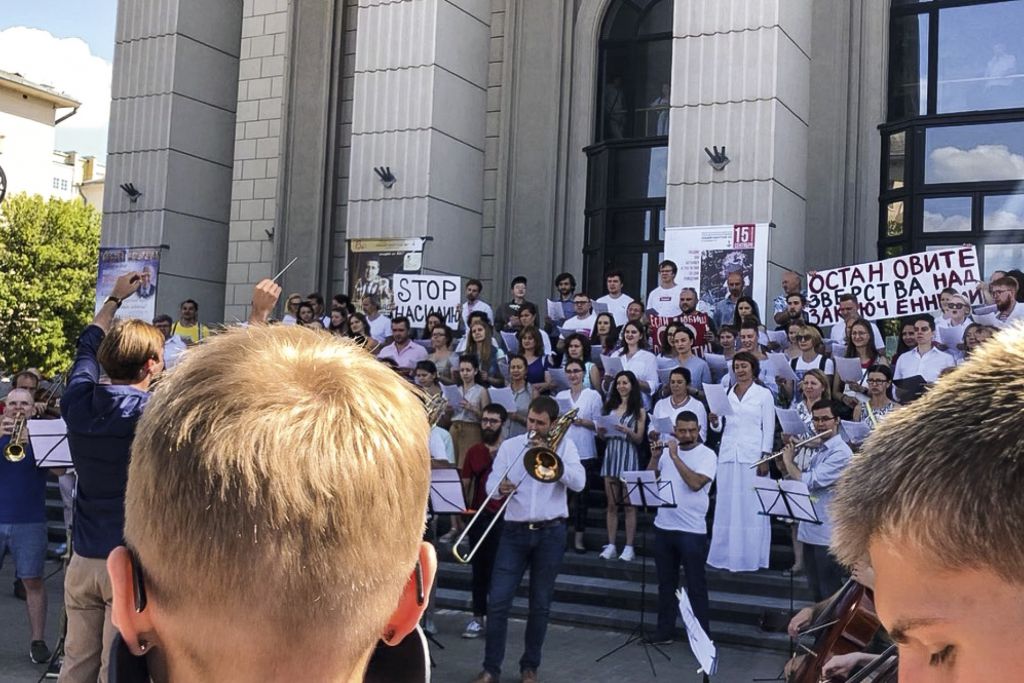“People have been shaken up, politicised, they need more networking, and they need our support!”
Olga Shparaga, philosopher, activist, and author (The Face of the Revolution is Female: The Case of Belarus) speaking at the mdw on the anniversary of the Universal Declaration of Human Rights on 10 Dec. 2021.

December 2021. The crisis on the Belarusian border has been dominating media coverage for weeks. The European Union is accusing Belarusian ruler Alexander Lukashenko of deliberately channelling thousands of refugees to the EU‘s external borders in an attempt to pressure the bloc into lifting economic sanctions and recognising his “re-election” in August 2020.
Since this fraudulent presidential election, hundreds of thousands of Belarusians have fled the country to escape the state’s ongoing campaign of terror. Olga Shparaga is one of them. A co-founder of the feminist faction in the Coordination Council of the Democratic Opposition, she was imprisoned in October 2020. To escape the threat of criminal trial, she fled to Vilnius. Currently, Olga Shparaga1 lives in exile in Berlin where she is a fellow at the Wissenschaftskolleg.

In her lecture2, she describes the social and political conditions—including dissatisfaction with autocratic politics, the undermining of political rights, and the rise of a new middle class – that have enabled the emergence of a pro-democracy movement supported by groups from all across the social and professional spectrum.
Networking and social solidarity were bolstered to a great extent by independent digital platforms and social media3. Neighbourhood initiatives such as “Courtyard Communities” identified 1,155 such digital channels, which were used to organise meetings, lectures, and concerts in courtyards across the cities of Belarus.

Chains of solidarity and women’s marches were orchestrated in protest against Lukashenko’s paternalistic rule—which, according to Olga Shparaga, can be regarded as a symbol of civic emancipation and “subjectification of women”. They reveal the close interlinkages between domestic and other forms of violence and violence perpertrated by the state. The “united women’s team” of Svetlana Tikhanovskaya, Maria Kolesnikova and Veronika Zepkalo came to represent a new model of political leadership, one that played a significant role in society’s activation. Advocating for electoral participation as a fundamental right, they appealed to the full breadth of civil society. The flutist, conductor and cultural manager Maria Kolesnikova, who decided not to go into exile and therefore faces a lengthy prison sentence, has become the symbolic figure of the entire movement.
What was so important about the activities of women within the pro-democracy movement? What was important was that they introduced new ideas and strategies. ‘Peaceful’, ‘horizontal‘ and ‘creative’—that’s how we could characterise the role and the activities of women. The women involved were very different, with differing concerns. In my book, I used Judith Butler’s term ‘assemblage’ to refer to the way in which women networked and connected during the various phases of the protests.
Sisterhood, the experience of helping one another, played a hugely important role in women’s political activation, especially in prison but also elsewhere. And this experience was present throughout Belarusian society. After the elections took place on 9 August, there were three days of terror with more than 6,000 people arrested, tortured. It was then, on 12 August, that the first chain of solidarity emerged. (…)

The number one dilemma facing the people of Belarus since this new wave of political repression took hold in the spring of 2021 was the following: ‘To flee is impossible, and to remain is impossible.’ We are already aware that since the summer of 2020, more than 40,000 people have been detained in Belarus, with criminal proceedings having been initiated against 4,000. Now we are already looking at 450 non-governmental organisations having being forcibly closed down by the state. To date, the human rights organisation Viansa4 has identified more than 900 political prisoners, amongst whom are 30 journalists and 37 students. We know that Belarus remains in a state of grave crisis. Yet the people of Belarus continue to exhibit acts of courage and resistance. And activists are remaining in the country, despite knowing that they face almost certain arrest and years of imprisonment.

Taciana Niadbaj, who is deputy chair of PEN Belarus and currently leads the country’s PEN Center from Warsaw, recently wrote: ‘Good deeds at the present time demand silence so as not to attract the attention of the repressive machine.’ She also presented the PEN Center’s research detailing 1,032 examples of human rights violations against cultural workers in Belarus between January and September 2021. And this number is growing. It shows that the crisis is not over, but is getting worse. A year ago, these human rights violations were linked to the protests in the streets. In 2021, however, persecution continues in ‘hidden forms’. Here, for example, we are talking about dismissals and various forms of suppression of free speech. People find themselves in prison for lighting a candle on the anniversary of a protester‘s death or for displaying tattoos for political protest. It is about intimidation, arrest, and prosecution of active citizens, torture in prisons, denial of parental rights, and other forms of persecution.

Maria Kolesnikova recently wrote in a letter from prison: ‘The most important thing is to help and support each other. We are united by a common goal: a free and democratic Belarus, in which human beings are of the highest value… Such quotations testify to the fact that there is no turning back, that what happened in Belarus in 2020 offers a perspective for the future. People have been shaken up, politicised, they need more networking, and they need our support. (…)

When talking about the situation in 2021, there are three terms I use: resistance, patience, caring. I used these terms half a year ago and I continue to use them today. It seems to me that resistance is still the issue—less in terms of protest demonstrations, but certainly in terms of partisan resistance of various kinds. We need patience, of course, for this path is long. The notion of caring is one that is very important to me. It has to do with mutual support, with the principle of horizontal cooperation, and with Belarusian society’s self-transformation and self-perception. It is with this Sorgegemeinschaft [care-community] that I associate the democratic future for Belarus. I view this as an alternative to the ‘national community’5.
The full evening lecture and the subsequent discussion with Renata Schmidtkunz are available online at: mediathek.mdw.ac.at/menschenrechte2021
The important initiative “Political Prisoner – My Friend” (politzek.me/en) offers all those who are interested the opportunity to offer their support through written correspondence.
- For more information on the presenter and moderator, see: mdw.ac.at/menschenrechte
- Transcription of this lecture: Heidi Wilm, edited by Julia Kordina and Heidi Wilm. References: Olga Spharaga.
- Cf. Gregory Asmolov (2020, September 1). The path to the square: the role of digital technologies in Belarus. OpenDemocracy. www.opendemocracy.net/en/odr/path-to-square-digital-technology-belarus-protest
- See: prisoners.spring96.org/en
- Cf. Olga Shparaga. A Feminist Framework for Understanding of the Role of Women in the Belarusian Revolution: Domestic Violence, Care, and Sisterhood. www.iwm.at/blog/a-feminist-framework-for-understanding-of-the-role-of-women-in-the-belarusian-revolution

